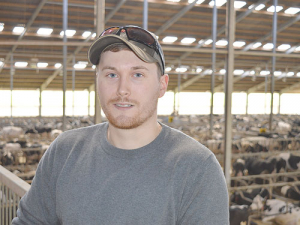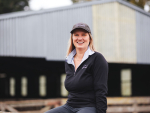Stephen Cooke visited a 1000-head barn with an automated milking system in east Germany recently. Read more about the farm here.
The farm, owned by The Lansink family – Gerhard and Ivana and their son Guus, profits from biogas, earning money from the energy company and subsidies from the Government – 90 Euros/tonne. Their animal waste is mixed with a self-propelled feeder, making methane which is burnt off and generates electricity, which he is paid for.
That waste is then used to fertilise grassland. It has a higher concentrate of nitrogen than dairy slurry and has proven more effective.
“The way the dairy market is, it would have been more profitable to invest the money we spent on the barn in a new biogas generator,” Guus Lansink said.
Farmers must give their processors two years notice of intention to leave, and Guus says they can be told their price two weeks into a month or at the start of the month.
There is a bonus for additional fat and protein but litres milk is the main profit drivers. Once you produce a benchmark for fat and protein the additional cost required to raise this is not necessarily rewarded.
“Effectively, the more I produce the more I’m paid. A few months ago we averaged 38L/day and that was a bit too much. We always need to look at what can be produced but also ask, is it going to work out for cows? We’re happy at 36 – 36.5L/day.”
They produce 33,000 - 34,000L/day (3.9% fat and 3.4% protein).
However, the real bonus is supplying non-GMO milk.
“It’s a huge thing in Germany now; they are going crazy for non-GMO.”
It wasn’t hard to change because GMO products are banned in the EU. They had to switch their soya bean supply from the US to Hungary.
“We just feed that and show the government we’re not using non-GMO products from companies that don’t use GMO products in those trailers.
“They’re pretty much forcing us to do so. DMK said ‘produce non-GMO or we’re not taking your milk’.”
• Lely paid for Stephen Cooke’s trip to Germany and the Netherlands.
















